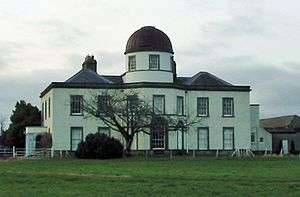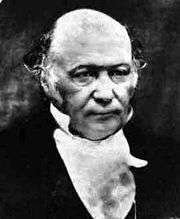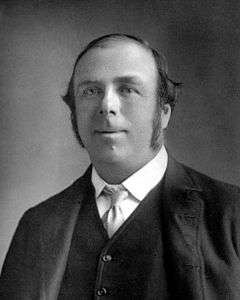Andrews Professor of Astronomy

The Andrews Professorship of Astronomy is an honorary chair in astronomy in the University of Dublin, having formerly been a position as astronomer in charge of the Dunsink Observatory.
From 1792 to 1921 the holder was also Royal Astronomer of Ireland.
History

Francis Andrews, Provost of Trinity, died on 18 June 1774 leaving £3,000 in his Will to provide a new observatory, to be built at Dunsink, and to establish a Dublin chair in astronomy. The position was regulated by a new Statute of Trinity College, which required the new Andrews professor to "make regular observations of the heavenly bodies ... and of the sun, moon and planets". The first professor, Henry Ussher, was appointed in 1783.[1]
Between the years 1792 and 1921, the holder of the chair also held the title of Royal Astronomer of Ireland of Ireland, granted under letters patent of King George III.[1]
The third holder of the chair was William Rowan Hamilton, who was appointed before he had taken his first degree, while still aged twenty-one. He neglected his official duties, focussing on important research into theoretical physics and mechanics.[1]
In 1921, on the departure of H. C. K. Plummer, Trinity ceased to fund the Observatory at Dunsink and the professorship, which fell vacant. In 1947 the Dublin Institute for Advanced Studies took over the Observatory. The prospect of Trinity's appointing further Royal Astronomers of Ireland was ended in 1966 when new statutes were adopted.[1]
In 1984 the Andrews chair was re-established as an honorary position, and since then it has been held by Patrick Arthur Wayman and Luke Drury.[1]
List of Professors

Professor
- 1783–1790: The Rev. Dr Henry Ussher (died 1790)
Professors and Royal Astronomers of Ireland
- 1792–1827: The Rev. Dr John Brinkley, in 1826 was appointed Bishop of Cloyne
- 1827–1865: Sir William Rowan Hamilton, died in office 2 September 1865
- 1865–1874: Dr Franz Friedrich Ernst Brünnow, retired due to failing health and eyesight
- 1874–1892: Sir Robert Stawell Ball, in 1892 became Lowndean Professor of Astronomy and Geometry at Cambridge
- 1892–1897: Dr Arthur Alcock Rambaut, in 1897 became Radcliffe Observer at Oxford
- 1897–1906: Dr Charles Jasper Joly, died in office on 4 January 1906
- 1906–1912: Sir Edmund Taylor Whittaker, in 1911 became a professor at Edinburgh
- 1912–1921: Dr Henry Crozier Keating Plummer
- 1921–1984: Vacant
Honorary professors
- 1984–1998: Patrick Arthur Wayman
- 1999— : Luke Drury
Notes
Further reading
- P. A. Wayman, The Andrews Professors of Astronomy in The Irish Astronomical Journal